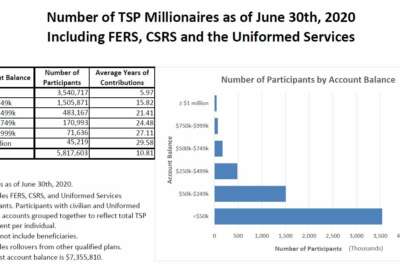Fact: The coronavirus has changed just about everything for just about everybody everywhere. It’s not an original or profound thought, but true.
Think about what you were doing, thinking, planning six months ago compared to the reality of now, today. And nobody, for sure, knows what the next six months hold.
A lot of people who retired last year or earlier this year probably wish they hadn’t. Most are living on less — an annuity, maybe Social Security compared to a steady, upwardly mobile paycheck. And given what the pandemic has done to the economy, substantial, some would say sustainable, future cost of living adjustments for retirees aren’t in the cards.
Many Federal Employee Retirement System retirees are living on a lot less and that gap will grow because of the diet-cost of living adjustment of their pension plan. The huge hit to the stock market came at a time when some, maybe a lot of long-time or recent retirees began to tap their TSP accounts. On the other hand many people who planned to retire but didn’t, for whatever reason, probably now wish they had pulled the plug. Going into the office every day or returning later if they are teleworking now is a scary concept.
So what next? Currently the media is reporting on the office of the future, with most of us either teleworking or on modified shifts. Much of their focus has been on tech companies — not the real work world. They’ve zeroed in on outfits where people in theory can work for a Silicon Valley, Seattle or Austin based outfit from a cabin or trailer in Idaho or North Carolina — as some already do.
They’ve also figured out that pampering workers with free food, video games, massages and nap rooms is nice but expensive, too. They haven’t spent much time looking at the nation’s largest employer: State and federal government operations. And the government, for all its teleworking, is still a hands-on operation in many of its functions. Workers at two of the largest operations — the Social Security Administration and the Internal Revenue Service — often need to deal directly with customers, many of whom are not computer or tech savvy. It will likely be a while before air traffic controllers, Immigration and Customs Enforcement agents or Department of Veterans Affairs employees can work from home.
So if you’re suffering from mid-life pandemic crisis what, if anything, should you be doing? Hurry into retirement, or delay it? Maybe decide to work ’til you drop?
Back in the day, before you-know-what, there were best days to retire scattered throughout the years. There are times in December and January when you can get higher payments for your unused annual leave, and lower your taxes at the same time. Or times mid-year when it pays, literally, to retire then and not the day before or after. Also there are things you can do right now, whether you’re 25 years old or 80 years old, to make retirement better.
So who knows best?
We’ve got the answer: Tammy Flanagan, federal benefits expert to the stars (and you too) and she’s my guest today on our Your Turn radio show. Tammy discovered the best-day-to retire concept. She worked for the FBI and her husband is a Secret Service retiree, so she knows the law enforcement side of retirement as well as the maze that regular Civil Service Retirement System and FERS employees must go through. The show starts at 10 a.m. EDT. You can catch it live on www.federalnewsnetwork.com or on 1500 AM in the Washington, D.C. area.
Tammy is now retired (a term I use loosely in her case) and runs a consulting service for retirees and those considering it. If you have questions for Tammy you want answered today send them to me before show time at mcausey@federalnewsnetwork.com. The show will be archived on our web page so you can listen anytime or refer it to a friend or coworker.
Meantime, hang in there. We are all, to some degree, in the same boat.
Nearly Useless Factoid
Similar to hibernation, some animals in hot, arid climates undergo a state “aestivation,” or estivation, during the summer. This is also described as animal dormancy, inactivity and a lowered metabolic rate.
Source: Wikipedia
Copyright
© 2024 Federal News Network. All rights reserved. This website is not intended for users located within the European Economic Area.
